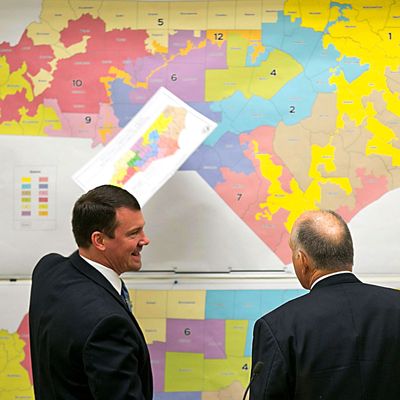
Last year, North Carolina Republicans argued that they did not draw their state’s congressional map with the aim of minimizing the influence of African-American voters — they drew it to minimize the influence of all Democrats, regardless of color or creed! The Supreme Court disagreed, and ruled that two of North Carolina’s House districts were unconstitutional racial gerrymanders.
Several months and one new map later, a federal court in North Carolina accepted the GOP’s old argument Tuesday: Republicans had now gerrymandered the state in a manner that discriminated against Democrats, in general — not just black ones. But, for the first time ever, that federal court ruled that partisan gerrymandering violated the 14th Amendment’s guarantee of equal protection. The three-judge panel ordered North Carolina to draw a new, less partisan map by January 24 — or else, the judges would draw a new map for them.
Judge James A. Wynn Jr., in a lengthy, scathing opinion argued that “a wealth of evidence proves the General Assembly’s intent to ‘subordinate’ the interests of non-Republican voters and ‘entrench’ Republican domination of the state’s congressional delegation.”
The ruling could have major implications — in North Carolina in the short term, and throughout the country in the long one. A nonpartisan congressional map would likely swing at least two — and as many as five — of the Tar Heel State’s House seats into the Democratic column. Given current polling of this fall’s midterm elections, that could well be the difference between a Democratic- or Republican-led House in 2019.
That said, in all likelihood, the Supreme Court will stay the decision, allowing the 2018 election to proceed on the disputed map. The justices are currently mulling a pair of cases concerning partisan gerrymandering.
In 2004, justice Anthony Kennedy ruled that in certain, extreme cases, partisan gerrymandering was unconstitutional — but that the court lacked a “limited and precise” standard for when a gerrymander goes too far. Over the ensuing decade, academics worked to provide Kennedy (often the “swing” vote on the high court) with such a standard. Nicholas Stephanopoulos of the University of Chicago, and Eric McGhee of the Public Policy Institute of California, produced the “efficiency gap” — a mathematical measure of how many Democratic or Republican votes are “wasted” by a given gerrymander, which is to say, how many partisan voters are packed into districts so uncompetitive, their ballots count for nothing.
Plaintiffs in Wisconsin used that standard to challenge the state’s GOP-drawn map. They won before a three-judge panel; the Wisconsin State Assembly appealed; and the Supreme Court heard the case last October. In oral arguments, Kennedy appeared sympathetic to the plaintiff’s case. Later this year, the Court will hear a case brought by Maryland Republicans, who argue the Democrats redrew the state’s House districts with the unconstitutional intention of flipping a Republican-held seat.
Thus, there’s a good chance that North Carolina Republicans will (at least) be able to run one more election on their rigged map, while the Supreme Court sorts these other cases out. Regardless, Tuesday’s ruling remains highly significant. Pennsylvania’s Supreme Court will soon rule on whether the GOP unconstitutionally gerrymandered congressional districts in the Keystone State. Late last year, a lower court found that the map was drawn to give Republicans an advantage – but concluded that partisan gerrymandering did not violate the state constitution. Judge Wynn Jr.’s decision could provide Pennsylvania’s high court – which is composed of five Democrats and only two Republicans – with a rationale for overturning the lower court’s decision, and ordering a new congressional map for the 2018 elections. If such an order is handed down, there’s a good chance that the (federal) Supreme Court would not stay the decision, since the ruling would center on Pennsylvania state law. Currently, despite the near-even partisan split in the state, Republicans hold 13 of Pennsylvania’s 18 House seats.
Beyond its implications for Pennsylvania, the North Carolina ruling could also, plausibly, nudge Anthony Kennedy towards striking down Wisconsin’s gerrymander.
As the Maryland case demonstrates, gerrymandering is a bipartisan hobby. But thanks to the Democratic Party’s heavy losses in 2010, right before maps were redrawn to comport with the new Census — and right around when state-of-the-art gerrymandering software became available to state legislatures — the GOP currently enjoys the overwhelming benefits of a system that empowers majority parties to pick their own voters. Without gerrymandering, Democrats would have likely won control of both houses of Congress in 2012. The policy implications of that development would have been profound. To take just one example: Millions of law-abiding, undocumented immigrants might have been able to secure legal status before the Trump era descended upon them.






























